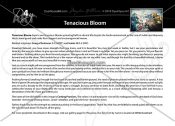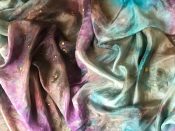 Tenacious Bloom depicts our tenacious bloom sprouting forth in vibrant life despite the harsh environment as the Lion of Judah and Heavenly Hosts stand guard and make their support and encouragement known.
Tenacious Bloom depicts our tenacious bloom sprouting forth in vibrant life despite the harsh environment as the Lion of Judah and Heavenly Hosts stand guard and make their support and encouragement known.
- Song of Solomon 2:1 (AMPC) [She said] I am only a little rose orautumn crocus of the plain of Sharon, or a [humble] lily of the valleys [that grows in deep and difficult places].
- Isaiah 35:1-2 (NIV) The desert and the parched land will be glad; the wilderness will rejoice and blossom. Like the crocus, it will burst into bloom; it will rejoice greatly and shout for joy. The glory of Lebanon will be given to it, the splendor of Carmel and Sharon; they will see the glory of the Lord, the splendor of our God.
{hearing} Beloved, you have more strength than you know, and it is beautiful. You may feel weak or feeble, but I see your persistence and tenacity, the way you refuse to give up even when you feel done in and as if there is no hope. Yet you press on. Yet you press in. Yet you flourish and bloom. Nothing deters you from forward progress. Your eyes do not waver to see what anyone else might be doing, you focus on pressing forward and on Me alone. This humble focus is the reason why you do not see what I see, and though the humility is beautiful beloved, I desire that you see yourself as I see you: beautiful in every way.
Just as a coach might yell encouragement from the sideline, so the Lion of Judah roars over you. His roar is a call to keep pushing, to be relentless, and to refuse to quit. His roar reminds all in earshot that you belong to Him, and that He is on your side. The sounds of His roar stirs your spirit as your spiritual ears hear and without thought you move to respond because your desire is for Him and Him alone – to worship and obey without compromise, and to Him be all the glory.
A Prophetic Nugget from our Dyed4you Ministries blog is connected to this. It’s called “Desert Bloom.”
Isaiah 35:1 (GW) The desert and the dry land will be glad, and the wilderness will rejoice and blossom.
Beloved, I have created you to flourish in rough terrain. Refuse to let the rocks and desert deter you from making progress, for I have equipped you to succeed – to flourish even in hostile territory. Nothing can hold you back. I AM on your side.
There is strength in your beauty, beloved. Put it on display for all to see. Don’t hold back. Expand to the left and the right – stretch out your reach and stake more territory, for I AM with you, My heavenly hosts surround you, and I AM protecting you at every turn. Listen for My voice and respond. It is time to bloom.
Isaiah 35:1-2 (VOICE) Imagine the wilderness whooping for joy, the desert’s unbridled happiness with its spring flowers. It will happen! The deserts will come alive with new growth budding and blooming, singing and celebrating with sheer delight. The glory of Lebanon’s cedars and the majesty of Carmel and Sharon will spill over to the deserts. The glory of the Eternal One will be on full display there, and they will revel in the majestic splendor of our God.
An article from Chaim Bentorah of Biblical Hebrew Studies called “Word Study: Rose of Sharon” is connected to this (We found is at: http://www.chaimbentorah.com/2014/04/word-study-rose-sharon/). After this link was shared to the team, but before it had been viewed, another team member got a download from Papa about this art piece. He showed a rose growing among the rocks or broken pavement – flourishing in rough terrain, beauty through overcoming trials. The word study below was an awesome confirmation of what He’d downloaded in addition to giving a lot of fascinating insights. We know the layers of revelation it contains will be a blessing.
Song of Solomon 2:1 “I [am] the rose of Sharon, [and] the lily of the valleys.”
Isaiah 61:3: “To provide for the mourners in Zion, to give them beauty instead of ashes.”
Let me show you something that is interesting. The word for beauty in Isaiah 61:3 is pe’er (Pei, Aleph, Resh) and the word for ashes is“’eper” (Aleph, Pei, Resh). Both words can be used to represent a turban.
Even Muslims will admit that turbans have their origins with Judaism. Oddly, it is rarely used by Jews today. Turbans have taken on many different meanings throughout it’s history. Among the Jews it was to be a sign of healing, purity and honor. Aaron as a high priest wore a turban as well as his sons. This was to be a sign that they were pure enough to be honored as a priest who also laid hands on the people and anointed them with oils to be healed.
Turbans were made of fine linen. Fine linen of ancient times was very difficult to come by and only the wealthy could afford it and by the time of Isaiah it was a sign of wealth and/or authority.
So why does Isaiah use pe’er and ‘eper. He will give them a turban instead of a turban. Pe’er is a turban worn by those who are honored or priest who performed healings. This is sometimes translated as beauty. Beauty here is used in the sense of purity, respect, or honor. The word for ashes ‘eper is also a Turban worn by the rich, and honored, but they are in state of mourning andsadness, thus we translate ashes as ashes represent mourning, penitence and sadness. Catholics probably know this symbol well as each year they receive ashes on their forehead as a sign of repentance and mourning for their sins. God will exchange a turban of healing, purity and honor for one of mourning and sadness.
I view this as a message for Christians. Many of us are wearing an ‘eper a turban underneath of which lies heartbreak, sadness, and mourning. God will exchange that ‘eper for a pe’er a Turban for healing, beauty and joy.
The ancient Jewish sages tried to explain this with an old story I read in Jewish literature. I was about a king who acquired the largest ruby in the world. He was so delighted and he gave it to the royal jeweler to polish it and make it perfect. The jeweler examined it with his practiced eye and replied: “Your majesty there is a crack in this stone.” “Well, fix it .” declared the king. “I can not.” replied the jeweler. “However, I can cut it into three smaller pieces and each will be beautiful and perfect.” But the king replied: “ No then it will not be the biggest, it will not be the best.”
The king hired a number of jewelers, but not one knew how to fix the crack and turn the jewel into a large, beautiful and perfect ruby.
One day a visitor came to the palace. He saw the ruby and asked permission of the king to examine it. After a long period of examination he said, “I can make your stone into something beautiful. The king asked: “Will it be big? Will it be beautiful? Will it be perfect?” The visitor replied: “Yes, yes and yes.”
Everywhere in the palace you could hear the grinding and polishing. It took three days (yes three, this is the way the sages tell the story). Finally the jeweler approached the king with the jewel covered by a black cloth. “It is still big? Is it beautiful? “Is it perfect?” asked the king anxiously. “Yes, yes and yes,” replied the visitor. “But, the crack, how did you get rid of the crack?” asked the King. “It is still there.” replied the visitor and with that he removed the black cloth to reveal the biggest, most beautiful and most perfect ruby in the world. At the center of the stone was now carved a most wonderful rose. The crack had become the stem. The king was awed and he did something unusual. He stopped talking and just stared in wonder at the worlds biggest, most beautiful and perfect jewel.
It is believed that this king was actually Solomon who called himself the Rose of Sharon, the term which we as Christians associated with Jesus in the Song of Solomon 2:1: “I am the rose of Sharon.” It is believed that Solomon wore a turban or a per’er (turban of healing, purity and authority).
Why did Solomon call himself the Rose of Sharon? Why do we call Jesus the Rose of Sharon? In Hebrew the Rose of Sharon ischabatstseth (Rose) HaSharon (the Sharon). Chabatstseth is believed to be the cistus ladanifer, a flower found among thorns. As goats and sheep would wander through bushes this flower would be entangled in their wool and at times penetrate their skin causing cuts and wounds. The shepherds would actually take these flowers entangled in their coats and rub them in their wounds to heal their wounds and prevent infection. Today we have an essential oil that we call the Rose of Sharon that is used for healing of cuts and wounds. Shepherds would often do a little side trading, collecting the Rose of Sharon and selling them to merchants who sold them to coastal traders to be turned into an oil to be used to soothe wounds suffered by soldiers in battle.
Oh, and the word Sharon, it comes from an ancient Semitic root word found in the Akkadian, Ugaritic and Phoenician language, it is the word sar which means a prince. Jesus is our Rose of Sharon who takes our ‘eper (turban of pain and heartbreak) and replaces it with a pe’er (turban of healing and honor).
We may have many flaws, but God created us as a beautiful gem stone. We only need the Rose of Sharon to take our flaws and make something beautiful out of it, to exchange our turban of mourning and heartbreak to a turban of healing and joy. It is the Rose of Sharon who gives us beauty for our ashes.
Pushing forward, breaking through the hard crust of parched and barren ground, the seed of promise planted within you starts to sprout. A tiny fleck of green life amongst the disparaging landscape. Yet you don’t give up, you push through and more of your intricate beauty comes to light; you are such a beauty to Me. At times it may be quite a struggle, but you continue to burst forth, declaring the promises I have birthed in you. Letting the beauty of your depth defy the rocky landscape and continue to bloom forth, as a visual shout of blooming color and beauty; a declaration of the life I have put within you.
The name of the silk hidden in this image is Coming Promises. The colors in it are turquoise representing river of life, mahogany brown representing the depth of God’s love, lavender representing the beauty of being known, camel representing steadfast, and gold shimmer representing beauty for ashes.
Father, thank You for the strength to continue pushing in the face of opposition. Thank You that You are faithful to stand guard and cheer us on. We will not back down! To You be all the glory.
![]()
![]()










0 Comments
4 Pingbacks